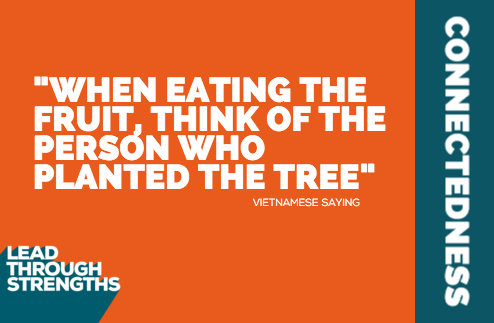Using Connectedness To See Opportunity – StrengthsFinder Talent Theme Connectedness
How I Use Connectedness to Realize New Opportunities, Practice Gratitude, and Learn More About the World Around Me
I finally took the plunge and registered for a guided one-week hiking trip in the backcountry of British Columbia, Canada. I had been talking about organizing my own multi-day backpacking trip for several years but had not (yet) made it happen. I decided to change my tactic and, instead of relying on myself to organize, I would pay and join a guided group. In that way, I would finally realize this hiking dream.
As is often the case with people who lead with Connectedness, the outdoors are my “happy place” and spiritual home, and a week of hiking was going to be the highlight of my summer.
Three weeks before my planned departure date, the trip was canceled due to insufficient registration. I was disappointed and downcast, and I wondered what lessons I needed to learn from this situation.
Knowing that being in a funk was not helpful (or a good model for my teens), I asked myself, “What opportunities are opening up for me now that I am not going on this hiking trip?”
The answers came quickly: more time with my daughter and son, volunteering for the Disability Foundation, and advancing a writing project for my coaching practice. Plus I would save a lot of time and money that I would have spent planning for the trip and on equipment.
In my head, the list of positives was growing and I was able to feel some gratitude for the things I would be able to do due to the trip cancellation.
The Superpower of Your StrengthsFinder Talent of Connectedness
People who are naturally talented with the CliftonStrengths talent theme of Connectedness tend to believe that what happens in our lives happens for a reason. When we reflect on the “why?” behind a particular occurence, the “reasons” come to us as connections between people, places, and events.
Connectedness is not a blasé state of denial about the agency I have in my life, nor is it a zen-like acceptance of everything that occurs but a genuine belief in the interconnections between all things. I do not use it as an excuse to sit back and accept oppression or injustices. In fact, because I (like others with high Connectedness) see the unity between things, I am drawn to causes and initiatives where I believe I am making a positive contribution to my community and planet.
 And so it was when the hiking trip was canceled.
And so it was when the hiking trip was canceled.
Once I made the conscious decision to see the good in the situation, I remembered a conversation I had just a few weeks before about an opportunity to volunteer at Agur Lake Camp, a unique camp for people with disabilities. At that time, I did not think I could help. Now I knew I could—and in the company of my darling teenage daughter!
Babbidy boom: I would have time with my daughter, make a meaningful contribution to others through volunteering, camp and be outdoors all weekend, and experience a new place within my province (I love discovering new places)! Yay!
I suspect it was partly because of some of my Connectedness talents that I was able to envision all the opportunities that were possible when the hiking trip did not go through.
Applying Your Strengths at Work and in Your Career
If Connectedness is dominant for you, consider the value—to yourself and others—if you consciously use it more often. When my Connectedness is activated, it triggers a sense of acceptance and trust, and this can bring calm to a situation.
For example, in building my coaching practice, I have had a tendency to work very hard (likely because I also lead with Achiever). A few months ago, I recognized that my pace was not sustainable and my Connectedness helped me gain a greater sense of trust that, even if I pushed less hard, things would evolve as they were meant to.
Another way my Connectedness supports me in my career is in my work as an educational developer at the University of British Columbia. There, I enjoy building bridges between different projects, people, and teams and love connecting people who (potentially or definitely) share a common interest and are not aware of each other’s work. I am energized by making connections because “you never know” what can happen!
Here are three ideas for ways you can invest in your Connectedness talent within the context of your career:
- Build connections between colleagues. In many organizations, silos exist between teams and/or members of a given team. Individuals may not know each other well and may not have strong social relationships at work, which can impede both their wellbeing and productivity. Or, they may have only faint understanding of what one another does and, as a result, may be missing out on the opportunity to collaborate meaningfully on work projects.Those who lead with Connectedness tend to easily see points of connection (surprise, surprise) between people, places, and things. As such, we are good at helping build bridges between our colleagues.
- Contribute some serenity to situations of stress. Your belief that “everything happens for a reason” (even if the reason is not readily apparent) can bring a sense of calm to stressful or unjust situations. I don’t suggest you utter the words “everything happens for a reason” out loud because that might be highly irritating or convey a sense of aloofness that you don’t feel to those who are undergoing the challenging situation. However, if you behave in a manner that communicates this fundamental belief, I believe it can bring some calm.
- Take care of yourself. People who are naturally talented in Connectedness are often caring and considerate, and because they see themselves connected to people and the planet, they may experience a strong feeling of responsibility at making their workplace (and the world!) a better place. If this resonates with you, it may be helpful to be selective about the workplace causes you take on and find ways to sustain your energy.
Isabeau is a Gallup-Certified CliftonStrengths Coach who helps individuals achieve greater fulfillment and joy in their work and career. She believes that when people have a strong understanding of their talent themes they are better at making choices that contribute to their well-being, including their happiness. You can find her at isabeauiqbal.com Isabeau also works as an educational developer at a research-intensive university where she supports the enhancement of teaching and student learning in higher education. She is happiest in the outdoors, spending time with her family and other nice people, and learning something new (not necessarily simultaneously!). Her Top 5 StrengthsFinder Talent Themes are: Learner | Intellection | Input | Achiever | Connectedness

